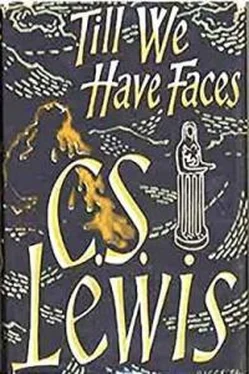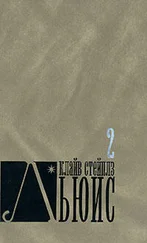“And you could—and you can—bear that?”
“You ask that? Oh, Queen Orual, I begin to think you know nothing of love. Or no; I’ll not say that. Yours is Queen’s love, not commoners’. Perhaps you who spring from the gods love like the gods. Like the Shadowbrute. They say the loving and the devouring are all one, don’t they?”
“Woman,” said I, “I saved his life. Thankless fool! You’d have been widowed many a year sooner if I’d not been there one day on the field of Ingarn—and got that wound which still aches at every change of weather. Where are your scars?”
“Where a woman’s are when she has borne eight children. Yes. Saved his life. Why, you had use for it. Thrift, Queen Orual. Too good a sword to throw away. Faugh! You’re full fed. Gorged with other men’s lives; women’s too. Bardia’s; mine; the Fox’s; your sister’s; both your sisters’.”
“It’s enough,” I cried. The air in her room was shot with crimson. It came horribly in my mind that if I ordered her to torture and death no one could save her. Arnom would murmur. Ilerdia would turn rebel. But she’d be twisting (cockchafer–like) on a sharp stake before anyone could help her.
Something (if it was the gods, I bless their name) made me unable to do this. I got somehow to the door. Then I turned and said to her:
“If you had spoken thus to my father, he’d have had your tongue cut out.”
“What? Afraid of it?” said she.
As I rode homeward I said to myself, “She shall have her Ilerdia back. He can go and live on his lands. Turn oaf. Grow fat and mumble between his belches about the price of bullocks. I would have made him a great man. Now he shall be nothing. He may thank his mother. She’ll not have need to say again that I devour her men–folk.”
But I did none of these things to Ilerdia.
And now those divine Surgeons had me tied down and were at work. My anger protected me only for a short time; anger wearies itself out and truth comes in. For it was all true; truer than Ansit could know. I had rejoiced when there was a press of work, had heaped up needless work, to keep him late at the palace; plied him with questions for the mere pleasure of hearing his voice. Anything to put off the moment when he would go and leave me to my emptiness. And I had hated him for going. Punished him too. Men have a hundred ways of mocking a man who’s thought to love his wife too well, and Bardia was defenceless; everyone knew he’d married an undowered girl, and Ansit boasted that she’d no need (like most) to seek out the ugliest girls in the slave market for her household. I never mocked him myself; but I had endless sleights and contrivances (behind my veil) for pushing the talk in such directions as, I knew, would make others mock him. I hated them for doing it, but I had a bittersweet pleasure at his clouded face. Did I hate him, then? Indeed, I believe so. A love can grow to be nine–tenths hatred and still call itself love. One thing’s certain; in my mad midnight fantasies (Ansit dead, or, better still, proved whore, witch, or traitress) when he was at last to be seeking my love, I always had him begin by imploring my forgiveness. Sometimes he had hard work to get it. I would bring him within an ace of killing himself first.
But the result, when all those bitter hours were over, was a strange one. The craving for Bardia was ended. No one will believe this who has not lived long and looked hard, so that he knows how suddenly a passion which has for years been wrapped round the whole heart will dry up and wither. Perhaps in the soul, as in the soil, those growths that show the brightest colours and put forth the most overpowering smell have not always the deepest root. Or perhaps it’s age that does it. But most of all, I think, it was this. My love for Bardia (not Bardia himself) had become to me a sickening thing. I had been dragged up and out on to such heights and precipices of truth, that I came into an air where it could not live. It stank; a gnawing greed for one to whom I could give nothing, of whom I craved all. Heaven knows how we had tormented him, Ansit and I. For it needs no Oedipus to guess that, many and many a night, her jealousy of me had welcomed him home, late from the palace, to a bitter hearth.
But when the craving went, nearly all that I called myself went with it. It was as if my whole soul had been one tooth and now that tooth was drawn. I was a gap. And now I thought I had come to the very bottom and that the gods could tell me no worse.
A few days after I had been with Ansit came the rite of the Year’s birth. This is when the Priest is shut up in the house of Ungit from sunset, and on the following noon fights his way out and is said to be born. But of course, like all these sacred matters, it is and it is not (so that it was easy for the Fox to show its manifold contradictions). For the fight is with wooden swords, and instead of blood wine is poured over the combatants, and though they say he is shut into the house, it’s only the great door to the city and the west that is shut, and the two smaller doors at the other end are open and common worshippers go in and out at will.
When there is a King in Glome he has to go in with the Priest at sunset and remain in the house till the Birth. But it is unlawful for a virgin to be present at the things which are done in the house that night; so I go in, by the north door, only an hour before the Birth. (The others who have to be there are one of the nobles, and one of the elders, and one of the people; chosen in a sacred manner of which I am not allowed to write.)
That year it was a fresh morning, very sweet, with a light wind from the south; and because of that freshness out of doors, I felt it, more than ever, a horrible thing to go into the dark holiness of Ungit’s house. I have (I think) said before that Arnom had made it a little lighter and cleaner. But it was still an imprisoning, smothering sort of place; and especially on the morning of the Birth, when there had been censing and slaughtering, and pouring of wine and pouring of blood, and dancing and feasting and towsing of girls, and burning of fat, all night long. There was as much taint of sweat and foul air as (in a mortal’s house) would have set the laziest slut to opening windows, scouring, and sweeping.
I came and sat on the flat stone which is my place, opposite the sacred stone which is Ungit herself; the new, woman–shaped image a little on my left. Arnom’s seat was on my right. He was in his mask, of course, nodding with weariness. They were beating the drums, but not loud, and otherwise there was silence.
I saw the terrible girls sitting in rows down both sides of the house, each cross–legged at the door of her cell. Thus they sat year after year (and usually barren after a few seasons) till they turned into the toothless crones who were hobbling about the floor, tending fires and sweeping—sometimes, after a swift glance round, stooping as suddenly as a bird to pick up a coin or a half–gnawed bone and hide it in their gowns. And I thought how the seed of men that might have gone to make hardy boys and fruitful girls was drained into that house, and nothing given back; and how the silver that men had earned hard and needed was also drained in there, and nothing given back; and how the girls themselves were devoured and were given nothing back.
Then I looked at Ungit herself. She had not, like most sacred stones, fallen from the sky. The story was that, at the very beginning, she had pushed her way up out of the earth; a foretaste of, or an ambassador from, whatever things may live and work down there, one below the other, all the way down, under the dark and weight and heat. I have said she had no face; but that meant she had a thousand faces. For she was very uneven, lumpy and furrowed, so that, as when we gaze into a fire, you could always see some face or other. She was now more rugged than ever because of all the blood they had poured over her in the night. In the little clots and chains of it I made out a face; a fancy at one moment, but then, once you had seen it, not to be evaded. A face such as you might see in a loaf, swollen, brooding, infinitely female. It was a little like Batta as I remembered her in certain of her moods. Batta, when we were very small, had her loving moods, even to me. I have run out into the garden to get free—and to get, as it were, freshened and cleansed—from her huge, hot, strong yet flabby–soft embraces, the smothering, engulfing tenacity of her.
Читать дальше











